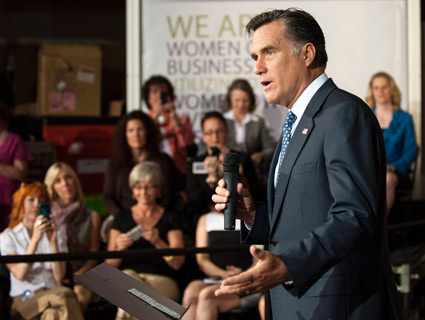Earlier this week, the media were atwitter with poll results showing that GOP presidential contender Mitt Romney was surging among women voters. Until the first debate, women, particularly single women, had been strong backers of President Obama, who in April this year was winning women by 19 points over Romney—and single women by 36 points. But on Monday, Democratic pollster Celinda Lake told USA Today that since Romney’s strong first debate performance she’d noticed a “a major surge among women in favorability for Romney” in “every poll.”
But after surging in the lady polls after the first debate, Romney whiffed on an important women’s rights question in the town hall-style debate on Tuesday night. Asked about gender equality, he tried to address the issue with his record on gender as Massachusetts governor. Instead, he ended up suggesting that he sees women as a compartmentalized problem to be dealt with through office supplies—”binders full of women.”
Don’t be surprised if, in the wake of the “binder” mess, women decide they don’t like Romney after all. Romney has never won a majority of women voters in any of his previous election runs. During the 2012 Republican primary, he lost women voters in many states to the sanctimonious and rigidly anti-abortion Rick Santorum and Newt Gingrich, a famous philanderer. He won the Massachusetts gubernatorial race in 2002 thanks only to men, losing women voters by 4 percent. During his first Senate race in 1994, Romney even managed to lose women voters by 24 points to Sen. Ted Kennedy (D-Mass.) in a year when Kennedy was struggling to overcome an image as a womanizer.
Romney was no more successful at hiring women to work for him at Bain Capital. Women held fewer than 10 percent of vice president positions during Romney’s tenure there, a problem he dismissed in 1994 by saying that private equity was “a profession that has yet to attract many women and minorities.”
Romney’s had lots of time to prep for a question on this topic. Kennedy bashed him with the issue to great effect in 1994, pointing out his horrible record at hiring women at Bain in TV ads. But in answering the question, Romney came off not like the nation’s stepdad, but like every woman’s worst boss. He’s the condescending guy who cuts you off in meetings, dismisses your ideas, and who then also believes there’s no such thing as gender discrimination. (His talking over moderator Candy Crowley certainly didn’t help his attempts to prove his respect for women in the workplace, either.)
Like the idea of “self-deporting” immigrants, Romney’s response to the debate question about gender inequality showed that he still thinks women “self-discriminate” by not flocking to high-finance or political jobs because, you know, they want to be home for dinner. Gender inequality, in Romney’s view, is not something that requires substantive national policy solutions, just more enlightened, paternal men at the top to generously fish women out of a binder and graciously give them jobs.














